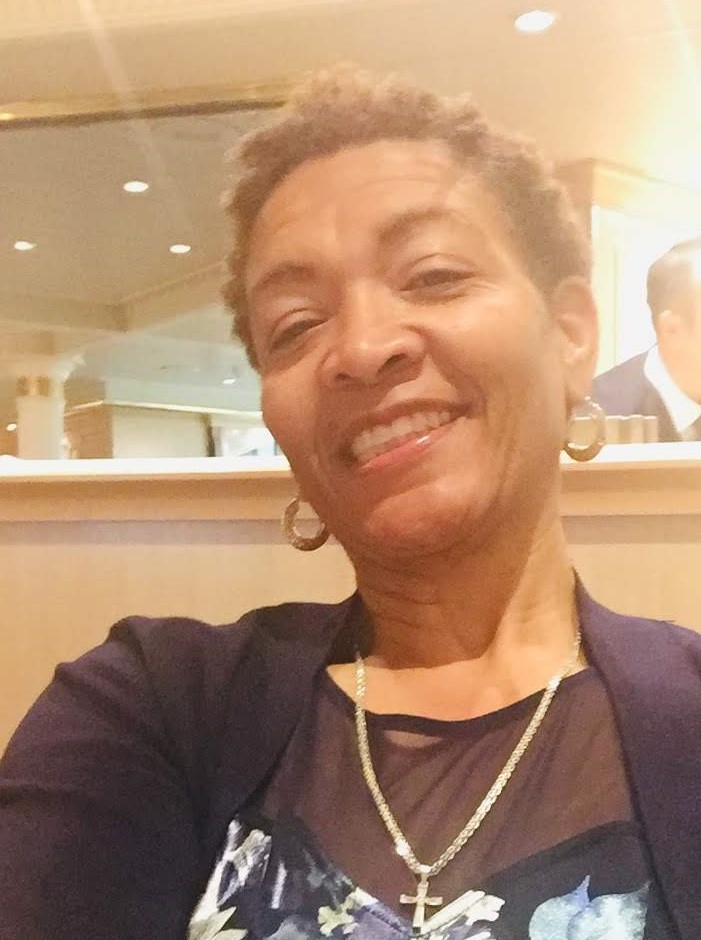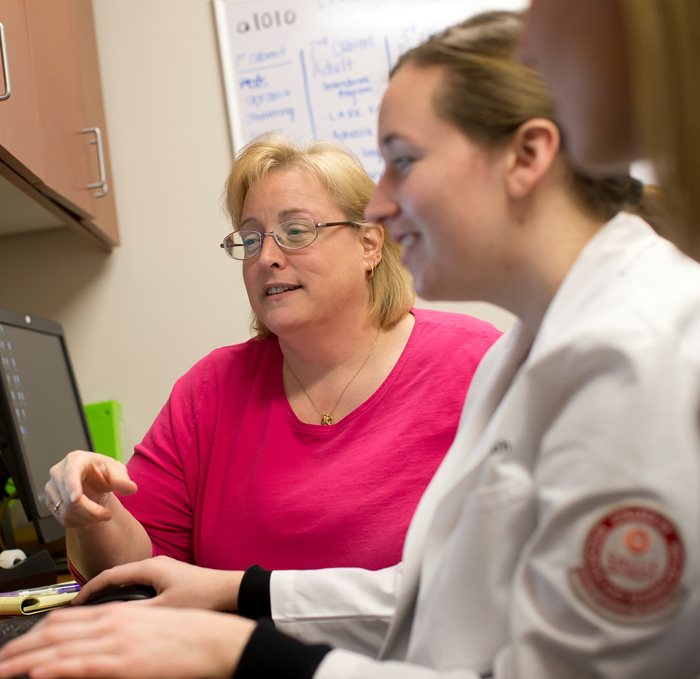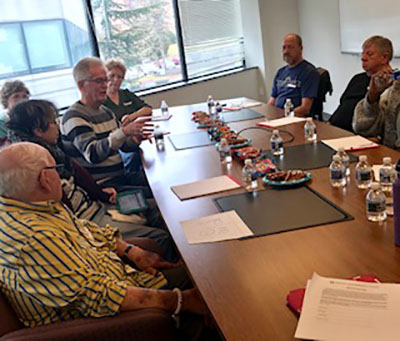Stroke Patient Advocates for Aphasia Awareness
 Dr. Denise Mendez worked for the Abington School District for 24 years. Starting in 1994, she held several positions ranging from Special Ed teacher culminating to the District Coordinator of Mathematics (K-12). She enjoyed teaching others, planning, and organizing. These are important skills that would help her through the new chapter in her life.
Dr. Denise Mendez worked for the Abington School District for 24 years. Starting in 1994, she held several positions ranging from Special Ed teacher culminating to the District Coordinator of Mathematics (K-12). She enjoyed teaching others, planning, and organizing. These are important skills that would help her through the new chapter in her life.
Three years ago, Dr. Mendez suffered a stroke which resulted in aphasia. Aphasia is a communication disorder that occurs because of damage to the parts of the brain that contain language. As a result, it can lead to problems with speaking, listening, reading, and writing. While an individual with aphasia may have difficulties performing these tasks, it does not affect their intelligence level.
"When I first had the stroke, I couldn't understand what was happening. I didn't understand I had issues. I thought I was talking OK." said Dr. Mendez. "But when I tried to read, it was like Russian. The first speech therapist who came to the house gave me a homework assignment. She told me to write the alphabet ten times. When she left, I told my sister she's crazy, I have a doctorate degree! My sister said just try it, which I did, and I couldn't get past the D. At that point, I thought I better just do what they tell me to do."
Dr. Mendez is grateful that one of her co-workers mentioned Salus University Speech-Language Institute (SLI), where she said she receives a much higher level of functional therapy than what she received at the hospital.
Dr. Mendez’s major communication issues include reading, writing, and speech issues and finding the right words when she's trying to say something. "I struggle with reading and writing. I was previously a big reader but have struggled since the stroke. Since the first stroke, I have read maybe three books in three years. In the beginning of speech therapy, I had to go back to books by Dr. Seuss like One Fish – Two Fish – Red Fish – Blue Fish. I still keep the book out in an area where I can see it, to remind me how far I’ve come." she notes.
Dr. Mendez also has problems with time management and following schedules. She uses electronic devices for reminders and writes notes. She has difficulty with effective communication where she can't think of names or words and has to explain the term which she states is frustrating.
 "I had a client explain to me once that it feels like there is a closet in your brain and you can't figure out how to open that door to get to that person inside anymore. The intelligence is there, you just can't access it because of the stroke," said Jill Grogg MS, CCC-SLP, Dr. Mendez's speech-language therapist at the Speech-Language Institute.
"I had a client explain to me once that it feels like there is a closet in your brain and you can't figure out how to open that door to get to that person inside anymore. The intelligence is there, you just can't access it because of the stroke," said Jill Grogg MS, CCC-SLP, Dr. Mendez's speech-language therapist at the Speech-Language Institute.
"When you're independent, it's hard to allow someone else to help or you may not have someone there to help. You want to communicate but it's not coming to you – it's in there but it just won't come out. With therapy, all of the strategies help me get that door open," said Dr. Mendez. "Some of the techniques that help me when I can't find a word - I will write the letters in the air or I'll use a description of the word when I can't think of the specific word in my vocabulary. Starting slowly or slowing down helps me out a lot. Pausing, if it's something complicated before I speak."
She also writes things down not just for reminders but it helps her to process what is actually happening.
Grogg said that the goal is to try to stay focused. "Sometimes Denise will go on a tangent and it's hard to rein her in, which is very typical of a stroke in that area. Denise suffered an intracerebral hemorrhage. Her second stroke was an arteriovenous malformation. Denise has been in the clinic for about three years now, and has come such a long way. When she first started, she could barely put two words together. There were so many tangents, she couldn't lasso any of the thoughts and rein them in. She has a lot of paraphasias. It looks like a stuttering behavior, but it is because the brain and mouth are not working together."
Dr. Mendez had a very hard time remembering her appointments. A previous first year student helped her put together an organizer and charts to help remind her when to take her pills, which she can check off so she knows she completed the task.
 Dr. Mendez is also part of the aphasia support group at the Speech-Language Institute. "It’s so important that you are with a group of people who get you and it," she said. "While everybody may be at different levels you learn about other effects of stroke, such as apraxia and dysarthria. Everyone has an opportunity to speak and what's great about it, is the students and supervisor are there to facilitate. It's easy to fall into melancholy or miss what was, instead of where you are now. Even if you don't say anything, you're there, you're part of a group. I look forward to this. It's a good community and keeps people tied in. The speech support group is just that – the support that really helps you get through every day."
Dr. Mendez is also part of the aphasia support group at the Speech-Language Institute. "It’s so important that you are with a group of people who get you and it," she said. "While everybody may be at different levels you learn about other effects of stroke, such as apraxia and dysarthria. Everyone has an opportunity to speak and what's great about it, is the students and supervisor are there to facilitate. It's easy to fall into melancholy or miss what was, instead of where you are now. Even if you don't say anything, you're there, you're part of a group. I look forward to this. It's a good community and keeps people tied in. The speech support group is just that – the support that really helps you get through every day."
Dr. Mendez says that the support group has encouraged her to do things that before the stroke she would never have done. Prior to the stroke, she would read for many hours, but now has trouble reading so she has discovered other activities. She crochets, writes, and does arts and crafts.
Dr. Mendez, Jill Grogg and Courtney, the speech-language pathology (SLP) student work on goals together.
"Jill really listens to me. When I'm trying to text or email the phonics doesn't seem to work as well as they used to. When Jill heard this, we worked on goals for fixing it. We set up the phone so if you type a few letters it will give five or so words to choose. Courtney gives me exercises based on my goals. This semester we worked on comprehension - reading and writing summaries so I really did comprehend the article - not just seeing words. They understand what is important to me to help me translate that to a goal for speech,” said Dr. Mendez.
Dr. Mendez has a new personal goal as well. She is an advocate for aphasia. "There's so much advocacy and awareness about aphasia that needs to be done. People don't even know that word or they think it means diminished intellect. That's my personal goal. Since I'm retired, my focus is advocacy," she said.
According to the National Aphasia Association, more than 84 percent of Americans have never heard of aphasia, but the disorder affects two million people in the United States alone.
"She has affected me as a therapist," Grogg said. "I actually use Denise as an example to many of my clients at my other job. She is just so inspiring to me as a therapist. The one thing Denise always says is 'I have aphasia but aphasia doesn't have me'. Those words stay with me. I've been a therapist, working with adults, for almost 30 years and never met anyone like Dr. Mendez before. It makes us want to fight even more because Denise is so vested."
 Grogg stressed the importance of having a stroke survivor advocating for persons with aphasia – someone who can speak aphasia and fill in the gaps. “Most people tend to isolate themselves after aphasia which leads to depression. People don't talk on the phone anymore, they almost lose their identity. They lose that person, though that person is still in there, we just need to get back to some semblance of normalcy in that person” said Grogg. "We need to step up our game so we can stay with her, help her to succeed, and get the word out about aphasia.”
Grogg stressed the importance of having a stroke survivor advocating for persons with aphasia – someone who can speak aphasia and fill in the gaps. “Most people tend to isolate themselves after aphasia which leads to depression. People don't talk on the phone anymore, they almost lose their identity. They lose that person, though that person is still in there, we just need to get back to some semblance of normalcy in that person” said Grogg. "We need to step up our game so we can stay with her, help her to succeed, and get the word out about aphasia.”
One of Dr. Mendez’s goals for next semester includes doing a series of podcasts on aphasia and stroke, which will be part of her speech therapy plan of care.
Speech-language therapy after a stroke can enhance a person with aphasia’s recovery. SLP’s and SLP students at the Speech-Language Institute of Salus University work with stroke victims to provide them with the most effective strategies and exercises for recovery.
Dr. Mendez encourages anyone who has suffered a stroke with aphasia to contact SLI. “It’s not just a service, it’s survival.”
If you or a loved one has suffered a stroke and is in need of speech-language treatment, contact us today.